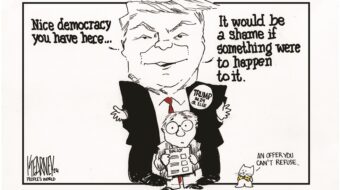SAN FRANCISCO – Attorneys for the opposing sides in the trial over California’s same-sex marriage ban gave their closing arguments before Chief U.S. District Judge Vaughan Walker June 16, moving the historic case one more step toward its probable destination, the U.S. Supreme Court.
Before the hearing, supporters of marriage equality gathered outside the courthouse. Noting that the closing arguments were taking place exactly two years after California began issuing marriage licenses to same sex couples, John Lewis told the crowd that he and his husband, Stuart Gaffney, “are the living proof that freedom to marry makes the lives of committed same sex couples better.”
The two, who have been together for 23 years, wed while it was legal to do so, after the California Supreme Court overturned the state’s ban on same sex marriages in May 2008 and before voters passed Proposition 8 again banning them the following November. They were plaintiffs in an earlier marriage equality trial.
“Something that was beautiful about the days before Prop. 8 was that every single human being in this state had the freedom to marry the person whom they loved,” Lewis said. “It didn’t matter what color skin you had, if you were rich or poor, what your gender or sexual orientation was. It was your humanity, your basic human shared instinct to love another human being.”
Gaffney added that the U.S. Supreme Court’s decision 43 years ago, in Loving v. Virginia, had “made it possible for my mom and dad, an interracial couple, to be legally married in all 50 states.” While it’s now “unthinkable” for interracial couples to be denied the right to marry, he said, “today couples like us face that same patchwork, legal here, not legal there. It needs to be healed now.” Same sex marriages are now legal in five states and the District of Columbia.
Inside the courtroom, Judge Walker, who had submitted 11 pages of questions to the attorneys in advance of the hearing, challenged pro-Prop. 8 lawyer Charles Cooper’s contention that it is vital to limit marriage to a man and a woman so “procreative sexual relationships” will result in stable family relations, with children raised by biological parents.
Walker, however, pointed out that people who cannot or do not wish to have children are allowed to wed, and called marriage a fundamental right extending to all people, while Theodore Olson, attorney for the two couples seeking to overturn Prop. 8, said the measure prevents a group of people historically subject to discrimination from participating in life’s most fundamental relationship.
During 12 days of testimony in January, the case for marriage equality was presented by the plaintiffs, Kristin Perry and Sandy Stier of Berkeley and Paul Katami and Jeff Zarrillo of Burbank, and by eight academic witnesses who testified that marriage has evolved over millennia and that procreation is a purpose, but not its sole purpose.
Supporters of a ban presented just two witnesses, and Cooper claimed it was not necessary to have evidence to prove the purpose of marriage was to have and raise children.
In 2000, Theodore Olson represented George W. Bush in Bush v. Gore, while the other lead attorney for the plaintiffs, David Boies, was on the other side, representing then-Democratic presidential candidate Al Gore.
Walker is expected to announce his decision this summer. If as anticipated, the case goes to the U.S. Supreme Court, it could be two more years before a final decision is reached.
Photo: Marilyn Bechtel/PW












Comments